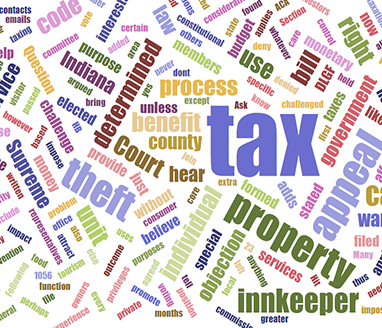By P J Klosinski
The problem with any law which adds a tax on anyone, any service, property or anything else is at the core the question of does the government has the authority to impose the tax at all? I challenged the DLGF for approving the budget of a unit for taxing to fund services the unit was not formed to provide. The case went through the local tax appeal process, the county process, the DLGF hearing process all of which denied any relief based on the position that the unit can tax for and use the money for whatever services the unit representatives want. This want, of course, is determined by those who are elected into office and their supporters regardless of the purposes found in the code for their formation. Following months of the primary appeal process, the case was filed with the Indiana Tax Court which determined I needed nine more property owners to bring a challenge to the budget committee. But if I owned the stated code value of property in the area then and only then did I (an individual) have the right to file an objection. I filed an appeal with the Indiana Supreme Court, which agreed to hear the case at first, then determined to deny hearing and left the outcome as written by the Tax Court, as an individual without specific code stated monetary value of the property, I have no right to appeal any tax or use. An individual has no right to appeal any tax at all, unless they hold specific monetary value (at least as applied to property tax). The constitutional violations in the case were never argued before the Supreme Court because a discriminatory law was passed stating an individual who was not approved by the state had no right to appeal a property tax.
Now, as to this bill, it adds to what is already imposed on innkeepers. They should join in opposition and probably would, however, as we all should know by now, they will just pass the increase on to the consumer without consideration unless they conclude it will impact their income. Of course, this tax is designed to help their revenue by the code’s definition; they would benefit. Many consider these as a tax on luxury service. This is not food, shelter, utilities, so anyone who uses this wants to and can afford the extra expense. This way Indiana says it is not harming those who are struggling as it applies to only those who can afford to use this service. To me this is a violation of Section 23 special privileges, allowing those who benefit from a tax to dispense the use of that tax to benefit their interests.
Primarily the bill is to control who can be a member of the commission appointed to promote the development and growth of the convention, visitor and tourism industry in a county. Do I believe this is a function of government, no? But then I also have no vote to cast against such a bill. These interests should be driven and funded by private investors who would benefit from them. And not the expense of taxpayers who receive nothing except perhaps some added value to their property if the county efforts attract people.
Is taxation theft, yes; if taxes are applied to a purpose government was not formed to provide. But then that means I challenge the US Supreme Court decision than when they determined that the ACA tax was authorized thus this would surely be used against any tax case as the “law.”
The only thing those concerned can do is to appeal in mass with calls and e-mails to all members of the GA as all will be voting on this. Do not limit your contacts to only your members I hear every time that they don’t hear from others like me who object, only those who want the bill. Question where does this money go to the general fund or is it dedicated? If it is being collected for a nefarious purpose like helping a particular interest that may help with the objection. Ask what it is being used for, and why? Hit them with your reasons for disapproval, not just “it is theft.” From experience, I can tell you elected officials do not care about that if they believe they are serving the greater good.
Reference:
https://iga.in.gov/legislative/2018/bills/house/1056#document-e612b555
https://iga.in.gov/legislative/laws/const/#document-article-1

